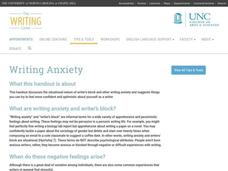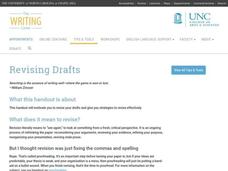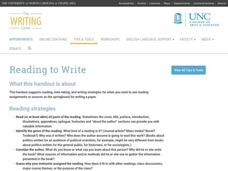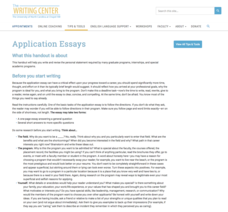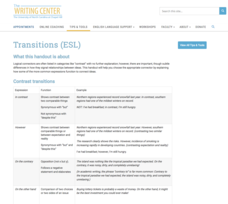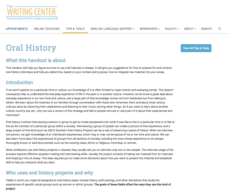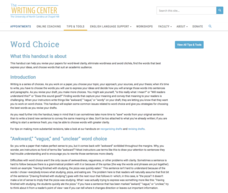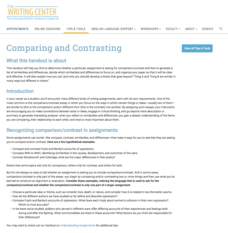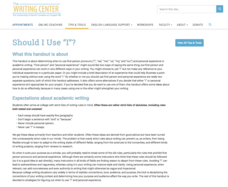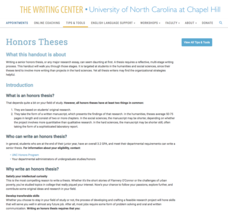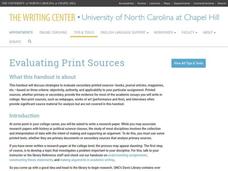University of North Carolina
Essay Exams
For decades, the sight of blue books has struck fear in the hearts of collegians. Those books usually signal an essay exam, the topic of one of the handouts in a larger series on specific writing assignments. Using the handout, writers...
University of North Carolina
Writing Anxiety
Oh, the dreaded writer's block! As part of a larger paper-writing series, an invaluable resource discusses obstacles and stresses writers face. Individuals learn to identify feelings associated with anxiety, as well as strategies for...
University of North Carolina
Revising Drafts
Don't simply proofread ... revise instead! Revising drafts is the topic of the 17th handout in UNC's Writing the Paper series of 24 lessons. Writers discover the importance of revision, as well as steps to follow during the process.
University of North Carolina
Reading to Write
Silly journal and essay prompts may be fun to write, but they don't model the kind of writing needed for college papers and standardized tests. The 15th part in a series of 24 covers the concept of reading to write—during and after...
University of North Carolina
Application Essays
There's a lot riding on good writing! Often, an application essay is the difference between acceptance and rejection. As part of a series on specific writing assignments and contexts, a handout helps scholars craft the perfect personal...
University of North Carolina
Understanding Assignments
"What do we have to do again?" Chances are you hear this question all the time. Here's a handout that offers scholars tips on how to understand college writing assignments. Class members learn strategies to help them decode assignments...
University of North Carolina
Literature (Fiction)
An informative installment of the Writing for Specific Fields series helps readers learn how to interpret and write about fiction. The website details nine easy steps for writing a literary analysis—a useful method for all readers!
University of North Carolina
Music
Music is a universal pleasure, but writing about it can be a little trickier. An informative handout discusses common types of music writing assignments that one might encounter in a college-level course. Individuals read about musical...
University of North Carolina
Transitions (ESL)
When it comes to comparing and contrasting in an essay, looking at a chart and picking a random transition word may not do the trick. As explained in an informational writing handout, the words writers use to move from one idea to...
University of North Carolina
Introductions
You never get a second chance to make a first impression. According to the 11th handout in the 24-part Writing the Paper series, that's why writing a strong introduction is so important. The handout offers strategies for crafting...
University of North Carolina
Book Reviews
Reading goes beyond taking in information—it also involves forming impressions about what we read. Sometimes we share those impressions through book reviews, a specific type of writing outlined in a handout on the topic. Using the...
University of North Carolina
Religious Studies
What is the difference between religion and religious studies? Readers find out after reading an online handout. It outlines common assignments in religious studies classes, such as critically evaluating religious texts and writing...
University of North Carolina
Anthropology
Anthropologists ask the question that everyone wants answered: what does it mean to be human? An online handout provides a brief introduction to the study of anthropology and outlines three common types of anthropology writing...
University of North Carolina
Verb Tenses
Twelve categories of verbs exist in the future tense, ranging from simple present to future perfect progressive, but only three have a place in academic writing. Those three tenses make up the content of an informational handout that...
University of North Carolina
Oral History
There's no better way to learn something than to hear it straight from the horse's mouth. A handout on oral history, part of a larger series on specific writing assignments, explains how to conduct interviews and use the information...
University of North Carolina
Audience
Challenging pupils' perspectives by having them walk in the shoes of the reader. An informative resource discusses how to identify an audience and anticipate their needs before writing an upcoming argumentative essay.
University of North Carolina
Art History
Art analysis might help uncover some of life's most puzzling questions, such as the mystery behind Mona Lisa's smile. The handout, from the Writing for Specific Fields series, is particularly useful for those interested in pursuing art...
University of North Carolina
Word Choice
Words matter, particularly in academic writing. Issues such as vague language, wordiness, and cliches make it difficult to get a point across. Part of a larger series to improve writing skills, the handout on word choice shows writers...
University of North Carolina
Summary: Using it Wisely
Sometimes summarizing keeps a writer from going deeper into their analysis—don't fall into that trap. Learn the difference between summarizing and analyzing using an insightful resource. Focusing on introductions, the lesson shares...
University of North Carolina
Comparing and Contrasting
Not all compare and contrast assignments have writers compare and contrast in the same way. Some only ask for comparisons, others only ask for contrasts, and many require more focus than a simple list of similarities and differences....
University of North Carolina
Should I Use “I”?
Despite the formal nature of academic writing, personal pronouns frequently appear in high school and college papers. While your first instinct may be to cross them out, sometimes it's okay to use them, an idea covered in a handout that...
University of North Carolina
Argument
What elements make up a successful argument? A helpful resource describes aspects of an argument such as the claim, evidence, counterargument, and audience. Perfect as an individual assignment for a flipped lesson or collaborative work,...
University of North Carolina
Honors Theses
For those enrolled in a college honors program, four years of hard work culminate in one paper—an honors thesis. A handout outlines the steps to writing the paper, beginning with a sample timetable and time management instructions. Once...
University of North Carolina
Evaluating Print Sources
Not all sources are created equal, so how do you evaluate them? Writers learn how to evaluate print sources based on elements such as audience, tone, and argument in the sixth handout of 24 in the Writing the Paper series from the...

